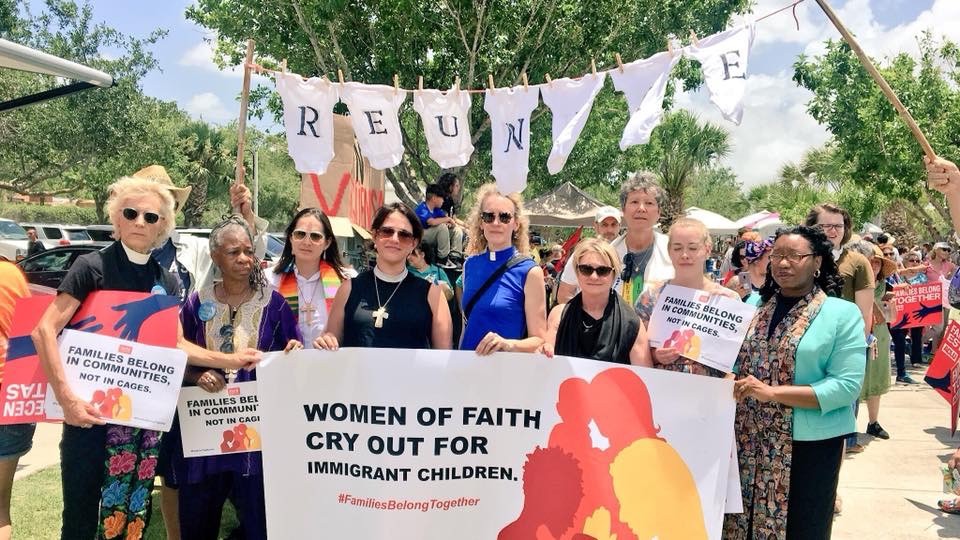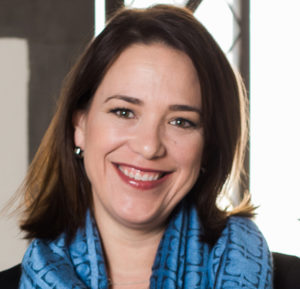Riverside Church in New York City held a members-only meeting Sunday, following a week of sensational headlines in competing newspapers covering the departure of senior pastor Amy Butler.
The Washington Post reported July 15 that during the meeting 11 members of the historically significant congregation introduced a petition demanding that Butler, former pastor of Calvary Baptist Church in Washington, D.C., be reinstated as senior pastor.

Amy Butler (wearing gold crucifix) joins women of faith including former CBF Executive Coordinator Suzii Paynter in a delegation to the U.S. southern border in June 2018. (PastorAmy.com)
Butler, who in the past wrote columns for Baptist News Global and its predecessor Associated Baptist Press, released a joint statement last Tuesday with the chair of the church council announcing that her five-year contract as pastor would not be renewed.
On Thursday the New York Times quoted unnamed sources who attribute her departure to sexism and the “stained-glass cliff” – the name given to an informal barrier faced by women in ministry. Unlike the so-called stained-glass ceiling, which keeps women from climbing up the ministerial ladder, the stained-glass cliff posits that women are actually more likely than men to get promoted if the organization is facing a crisis, increasing the odds that they will fail.
The New York Post followed up with a much different story about salary demands and possible conduct unbecoming a minister.
The Times then updated its story, without explanation, adding information originally reported by the New York Post about a visit to a sex shop and changing Butler’s courtesy title to Rev. and Dr. from the original Ms. The visit to the Smitten Kitten, which advertises itself as a “progressive sex toy store,” occurred during a May trip to a homiletics conference in Minneapolis by Butler, two other ministry staff and a congregant. While accounts of the visit differ, one of the two church employees later filed a formal complaint about the incident.
In Sunday’s sermon prior to the membership meeting, interim senior minister Michael Livingston said Riverside Church, long a bastion of progressive Christianity and social justice, is in the newspapers — and all over social media — “for no good reason at all.”
“I’m not sure why the newspapers don’t realize they are being used, manipulated by mostly unnamed people whose motives are as hidden as they are,” said Livingston, former policy director of Interfaith Worker Justice who joined the staff at Riverside in 2014.
“But we have no blame to direct to reporters doing their work,” Livingston said. “We are rightly distressed at how easy we make that work for them by the indiscriminate sharing of confidential documents that belong in file drawers and the human resources office in the tower of the church, because they are personnel matters about people we love who are a part of our community.”

Amy Butler
In their July 1 statement posted on the church website, Butler and church council chair Marilyn Mitchell said as her contract neared its end, both the pastor and lay leadership had been “prayerfully discerning how best to fulfill the work of God in the world to which they are called.”
“We are proud of the work of the church during the five years that Pastor Amy has been with the Riverside Church,” the statement said. “The council thanks Pastor Amy for her leadership and asks all congregants to pray for her continued ministry as a leader in the progressive Christian world.”
Livingston told church members that message “fully represented each word that Amy and the church council wanted to say about her departure.”
“Can Amy and they not be trusted to mean what they say and to say only what in their wisdom they deem necessary?” he asked. “Others, and the numbers just keep growing, think not.”
Livingston said the episode has made the already hard work of moving forward after a pastor leaves “enormously more difficult.”
In order to do that work, he said, “We just have to answer one question:
“Who is my neighbor? Amy Butler? The church council? Those who leak to the press? Those who agree with ‘my’ position with a particular solution to the problem at hand? Those who demand to know more, to know all? Those who struggle to accept what seems completed, sad and disillusioning as it necessarily is? Those who seem relieved and look forward to whatever comes next?”
“Who is my neighbor?” Livingston said. “That’s our question.”
“All of the above,” he said.
News of the departure of the first woman to occupy the pulpit in the iconic New York church built by John D. Rockefeller Jr. in 1927 struck a chord with other women in ministry who face unique challenges in church cultures traditionally dominated by men.
“I don’t know a woman pastor who has not experienced some form of sexual harassment, bullying, or intimidation at the hands of a person in church,” Mennonite pastor Melissa Florer-Bixler said in Sojourners. “But most of us are not prepared for how to respond and our churches are not trained on how to be advocates for us.”
On Wednesday Butler linked on Facebook to a website with the message: “For the moment, I am landing here.”
“I’m not here to entertain you,” says the welcome page to Pastor Amy Butler (pastoramy.com). “I’m here to disquiet you. I’m here to make you think. I’m here to make you ask some hard questions. That’s my job.”
The website contains her speaking schedule. Upcoming dates include Sept. 15 at Wilshire Baptist Church in Dallas for the 30th anniversary of Pastor George Mason and Sept. 16 at the Elevating Preaching conference at Duke Divinity School. A July 14 preaching engagement at North Carolina’s Montreat Conference Center, affiliated with the Presbyterian Church (USA), was canceled by Montreat.
Editor’s note: This story was updated July 16.
Previous story:
Amy Butler stepping down after five years at Riverside Church in NYC
